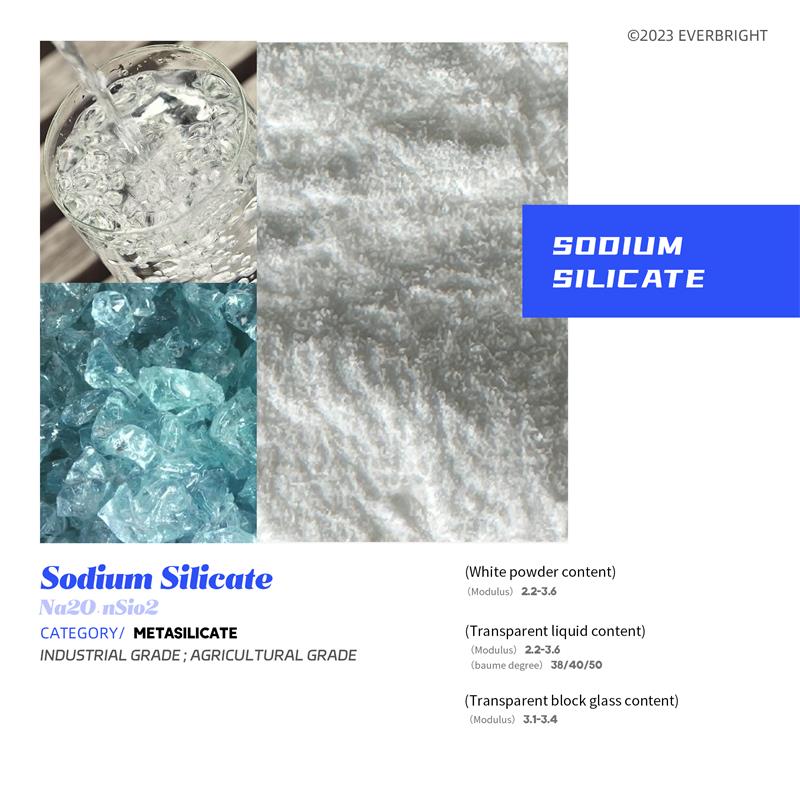Sodium Silicate
Product Details
Specifications provided
White powder content ≥ 99%
Transparent block content ≥ 99%
Transparency liquid content ≥ 21%
(Scope of application reference ‘product usage’)
The greater the modulus of sodium silicate, the more difficult it is to dissolve solid sodium silicate in water, n is 1 often warm water can be dissolved, n is increased by hot water to dissolve, n is greater than 3 requires more than 4 atmospheres of steam to dissolve. The greater the modulus of sodium silicate, the more the Si content, the higher the viscosity of sodium silicate, the easier to decompose and harden, the greater the bonding force, and the different modulus of sodium silicate polymerization degree is different, resulting in the drolysis of its products have important impact on the production and application of silicate components are also significant differences, so the different modulus of sodium silicate has different uses.
EVERBRIGHT® ‘ll also provide customized :content/whiteness/particlesize/PHvalue/color/packagingstyle/ packaging specifications and other specific products that are more suitable for your use conditions , and provide free samples.
Product Parameter
1344-09-8
215-687-4
100.081
Silicate
2.33g/cm³
soluble in water
2355 °C
1410 °C
Product Usage
Washing powder / paper making
1. Sodium silicate is the most valuable filler in the soap making industry. The addition of sodium silicate into laundry soap can buffer the alkalinity of laundry soap, reduce the loss of laundry soap in water, and enhance the washing ability and prevent soap rout; 2. Sodium silicate plays the role of helping wash, preventing corrosion and stabilizing foam in synthetic detergent; 3. Can be used as papermaking filler; 4. Used for the manufacture of silicone gel and silica gel; 5. Used as a binder in the casting industry, bonding sand and clay, making a variety of molds and cores that people need.
Silicon fertilizer
Silicon fertilizer can be used as a fertilizer to provide nutrients for crops, and can be used as a soil conditioner to improve soil, and also has the role of disease prevention, insect prevention and toxin reduction. With its non-toxic and tasteless, no deterioration, no loss, no pollution and other outstanding advantages.
1. Silicon fertilizer is a large number of yield-increasing elements required for plant growth, and most plants contain silicon, especially rice and sugarcane;
2, silicon fertilizer is a kind of health nutrition element fertilizer, the application of silicon fertilizer can improve the soil, correct the soil acidity, improve the soil salt base, degrade heavy metals, promote the decomposition of organic fertilizer, inhibit bacteria in the soil;
3, silicon fertilizer is a nutrient element fertilizer to improve crop quality, and the application of silicon fertilizer on fruit trees can significantly improve the fruit and increase the volume; Increased sugar content; The sugar cane with silicon fertilizer can increase the yield, promote the accumulation of sugar in the stalk and increase the yield of sugar
4, silicon fertilizer can effectively improve crop photosynthesis, can make the crop epidermis fine silicification, straighten the crop stems and leaves to reduce shade, enhance leaf photosynthesis;
5, silicon fertilizer can enhance the ability of crops to resist pests and diseases. After crops absorb silicon, silicified cells are formed in the body, the stem and leaf surface cell wall is thickened, and the cuticle is increased to improve the ability of insect prevention and disease resistance;
6, silicon fertilizer can improve the ability of crop lodging resistance, which makes the crop stalk thick, shorten the internode, thereby enhancing its lodging resistance;
7. Silicon fertilizer can improve the resistance of crops, and the absorption of silicon fertilizer can produce silicified cells, effectively regulate the opening and closing of leaf stomata, control water transpiration, and improve the drought resistance and dry hot air resistance and low temperature resistance of crops.
Building Materials/Textiles
1. Water glass coated on the surface of the metal will form alkali metal silicate and SiO2 gel film, so that the metal is protected from external acid, alkali and other corrosion;
2. Used as a binder to bond glass, ceramics, asbestos, wood, plywood, etc.
3. Used in the manufacture of refractory materials, white carbon black, acid-resistant cement;
4. In the textile industry, it is used as a slurry and impregnating agent, as a solid stain and mordant in the dyeing and embossing of textiles, and for the weight of silk fabrics;
5. Water glass is added to the leather production, and its dispersed colloidal SiO2 is used to produce soft leather;
6. In the food industry, it can be used to preserve eggs and prevent microorganisms from entering the eggshell gap and causing deterioration;
7. In the sugar industry, water glass can remove the pigment and resin in the sugar solution.
Professional technical engineer dedicated to guide you
According to your actual needs, choose the most reasonable overall design and planning procedures
